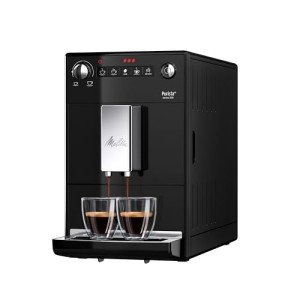Home Use Espresso Machines: A Comprehensive Guide
Espresso machines have ended up being a staple in lots of homes as coffee enthusiasts look for to reproduce café-quality brews in the convenience of their kitchen areas. The increase in appeal has actually caused a varied market filled with different models, features, and costs. This article aims to provide an informative introduction of home use espresso machines, helping readers browse their options efficiently.
Understanding Espresso Machines
Espresso machines work by requiring warm water through finely-ground coffee under high pressure, leading to a focused coffee beverage called espresso. There are Cappuccino Machines of kinds of espresso machines categorized based upon their developing techniques and level of automation. The most typical types include:
- Manual Espresso Machines: These require the user to control the pressure and water circulation, enabling a more hands-on coffee-making experience.
- Semi-Automatic Espresso Machines: These provide automatic control over water pressure, while the user by hand grinds and tamps the coffee.
- Automatic Espresso Machines: With the push of a button, these machines immediately control the circulation of water, making it simpler to brew espresso with consistent outcomes.
- Super-Automatic Espresso Machines: These all-in-one machines deal with grinding, tampering, brewing, and even milk frothing, making them perfect for users trying to find benefit.
- Pill or Pod Machines: These use pre-packaged coffee pods to develop espresso with very little effort, but they limit choice in developing methods and tastes.
Table: Comparison of Espresso Machine Types
| Type | Control Level | Alleviate of Use | Cleaning up Level | Suitable For |
|---|---|---|---|---|
| Manual | User-controlled | Moderate | High | Coffee perfectionists |
| Semi-Automatic | Partial automation | Moderate | Moderate | Home baristas |
| Automatic | Fully automated | Easy | Low | Busy people |
| Super-Automatic | Fully automated | Very easy | Extremely low | Convenience hunters |
| Capsule/Pod | Totally automated | Really simple | Really low | Casual drinkers |
Key Features to Consider
When picking a home use espresso machine, it's important to think about various features that can substantially affect the quality of espresso and user experience.
- Pressure: Look for machines that offer a minimum of 9 bars of pressure, as this is considered optimum for brewing espresso.
- Boiler Systems: Single vs. dual boiler systems figure out temperature stability and the ability to brew espresso and steam milk simultaneously.
- Grinder: Integrated grinders allow for freshly ground coffee, which enhances flavor. Consider machines with adjustable grind settings.
- Milk Frother: For those who delight in cappuccinos and lattes, an integrated steam wand or automatic frother is crucial.
- Size and Design: Consider your kitchen area area and visual preferences. Machines can be found in numerous sizes, from compact to big setups.
- Cost: Home espresso machines can range from a few hundred to several thousand dollars, so it's vital to establish a budget before exploring options.
Pros and Cons of Home Use Espresso Machines
| Pros | Cons |
|---|---|
| Benefit of brewing coffee at home | Preliminary investment can be high |
| Quality of espresso is typically remarkable | Needs some ability, specifically with manual machines |
| Capability to try out tastes | Upkeep and cleansing can be labor-intensive |
| Can conserve money in the long run | Not all machines will suit every coffee preference |
Maintenance and Cleaning Tips
Keeping an espresso machine is vital for lengthening its life and making sure constant brew quality. Here are some useful tips:
- Regular Descaling: Minerals from water can develop in the machine. Descale every 1-3 months, depending on water hardness.
- Daily Cleaning: Rinse portafilters, baskets, and steam wands after each use to avoid coffee oils from building residue.
- Use Filtered Water: This can assist minimize mineral accumulation and improve the taste of coffee.
- Replace Gaskets and Seals: These parts may use out over time and needs to be replaced to maintain pressure and performance.
- Check out the Manual: Each machine has specific care guidelines; following these will make sure longevity.
Frequently Asked Questions About Home Use Espresso Machines
Q1: What is the very best budget espresso machine?The best budget espresso machine typically depends on specific needs, however models like the DeLonghi EC155 or the Breville Bambino are popular amongst users for supplying terrific value. Q2: How long do home espresso machines typically last?With proper upkeep, home espresso machines can last anywhere from 5 to 15 years, depending upon the quality of the machine and frequency of use. Q3: Can I make coffees and lattes with any espresso machine?While most espresso machines can make coffees and lattes, having a reputable
steam wand or frother is essential for accomplishing the right milk texture.
Q4: Are super-automatic machines worth the investment?For those who prioritize convenience and fast brewing, super-automatic machines can be worth the financial investment, though they might lack some customizability in brew strength and taste. Q5: What kinds of coffee beans are best for espresso?While individual preference contributes, beans identified as" espresso "blends are usually roasted darker, producing rich tastes and a velvety texture when brewed.
Investing in a home espresso machine can transform the daily coffee routine into something special, raising home brews to café quality. By comprehending the various kinds of machines, crucial features to think about, maintenance requirements, and weighing the
advantages and disadvantages, consumers can make educated choices that fit their private choices. As the espresso culture continues to grow, no matter the choice, every brew can be a delicious experience waiting to be appreciated.

